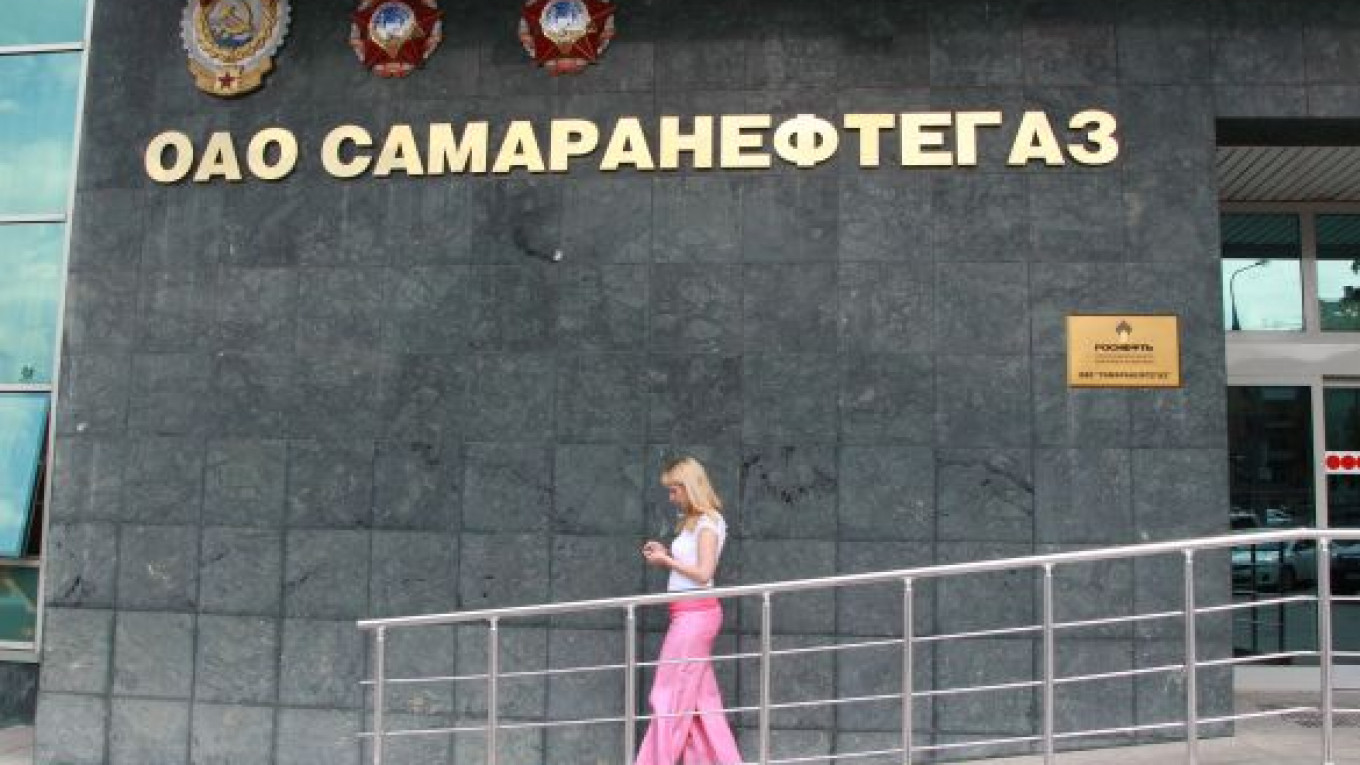Rosneft is losing legal battles with foreign former Yukos-affiliated companies over debt claims worth at least $1.12 billion and faces fines and asset freezes if it does not comply with foreign court rulings.
The lawsuits stem from loans granted to several Russian oil companies when they belonged to now-defunct oil giant Yukos. They were bought by state-owned Rosneft in 2007 after Yukos was bankrupted and dismembered as a result of what critics believe to be a politically motivated and illegitimate tax evasion case.
One of the companies, Samaraneftegaz, must either stop paying dividends to Rosneft or post a $186 million surety bond, according to a ruling issued by a New York federal court Tuesday in favor of Yukos Capital, a Luxembourg-based Yukos affiliate. From 2007 to 2010, Samaraneftegaz paid more than 44 billion rubles ($1.3 billion) in dividends to Rosneft. Data on more recent years has not been published.
Last October, the New York court ordered Samaraneftegaz to pay $186 million to Yukos Capital but Rosneft appealed the ruling.
U.S. courts have very broad jurisdiction and can hear cases involving foreign companies if they have some link to the territory of a specific U.S. state, for instance if they trade there or if the court deems that they cannot receive justice in their own country, said Alexander Kostin, a lawyer at Russian law firm Khrenov and Partners.
However, the New York court's order does not have any legal force in Russia unless accepted by a Russian court, he said.
"Russian courts have invariably rejected such orders," Kostin added.
But if a foreign company disobeys such an order, a U.S. court could find it guilty of contempt of court and fine it or freeze its accounts in the U.S., Denis Uzoikin, president of the Uzoikin, Piskov and Colleagues bar association, told Kommersant. Tougher sanctions could include criminal penalties on executives traveling in the U.S., he said.
The ruling could jeopardize Rosneft's future assets in the U.S. The company is currently buying a 30 percent stake in the La Escalere oil field in Texas and has an option to purchase 25 percent in the Point Thomson field in Alaska and 30 percent in 20 Exxon blocks in the Gulf of Mexico.
The New York case is not the only claim filed against Rosneft by Yukos-affiliated companies.
An Amsterdam court is currently considering Yukos International UK B.V.'s $333 million lawsuit seeking compensation for a freeze on the company's bank accounts imposed in 2008 due to an ownership claim by a company affiliated with Rosneft.
In 2009, an Amsterdam court also upheld a $424 million claim filed by Yukos Capital against Rosneft subsidiary Yuganskneftegaz. Rosneft had its accounts frozen by English, Irish and Jersey courts and had to pay the amount in 2010.
London's High Court of Justice will hear from May 13 to 15 Yukos Capital's lawsuit seeking interest worth $139 million on the same loan provided to Yuganskneftegaz.
Yukos Capital also won a legal battle with former Yukos affiliate Tomskneft in 2007, when a New York court ruled in favor of its $132 million claim.
Last year another Yukos affiliate, Glendale, obtained an Amsterdam court order requiring Rosneft to repay $76.6 million.
Apart from the debt claims of companies affiliated with Yukos, the defunct oil company's shareholders have filed a $100 billion lawsuit with The Hague-based International Court of Arbitration to seek compensation for what they call the illegal expropriation of Yukos' assets by the Kremlin.
Contact the author at o.sukhov@imedia.ru
A Message from The Moscow Times:
Dear readers,
We are facing unprecedented challenges. Russia's Prosecutor General's Office has designated The Moscow Times as an "undesirable" organization, criminalizing our work and putting our staff at risk of prosecution. This follows our earlier unjust labeling as a "foreign agent."
These actions are direct attempts to silence independent journalism in Russia. The authorities claim our work "discredits the decisions of the Russian leadership." We see things differently: we strive to provide accurate, unbiased reporting on Russia.
We, the journalists of The Moscow Times, refuse to be silenced. But to continue our work, we need your help.
Your support, no matter how small, makes a world of difference. If you can, please support us monthly starting from just $2. It's quick to set up, and every contribution makes a significant impact.
By supporting The Moscow Times, you're defending open, independent journalism in the face of repression. Thank you for standing with us.
Remind me later.






